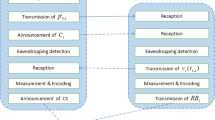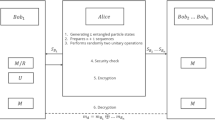Abstract
We proposed a novel and efficient multiparty quantum secret sharing scheme using entangled state which in that the number of parties can be arbitrary large. The state which we used, has special properties that make our scheme simple and safe. The operations which are needed to recover secret message, are only exclusive-or addition and complement operation. Moreover it is shown that this scheme is secure against eavesdropping. Also this scheme provides the best quantum bit efficiency compared with some famous quantum secret sharing schemes.
Similar content being viewed by others
References
Hillery M, Bužek V, Berthiaume A. Quantum secret sharing. Phys Rev A, 1999, 59: 1829–1834
Li Y, Zeng G H. A (2, 3) quantum threshold scheme based on Greenberger-Horne-Zeilinger state. Chin Phys, 2007, 16(10): 2875–2879
Deng F G, Zhou P, Li X H, et al. Efficient multiparty quantum secret sharing with Greenberger-Horne-Zeilinger states. Chin Phys Lett, 2006, 23(5): 1084–1087
Li B K, Yang Y G, Wen Q Y. Threshold quantum secret sharing of secure direct communication. Chin Phys Lett, 2009, 26(1): 010302
Shi R H, Huang L S, Yang W, et al. Multiparty quantum secret sharing with Bell states and Bell measurements. Opt Commun, 2010, 283: 2476–2480
Deng F G, Long G L, Liu X S. Two-step quantum direct communication protocol using the Einstein-Podolsky-Rosen pair block. Phys Rev A, 2003, 68: 042317
Hwang WY, Koh I G, Han Y D. Quantum cryptography without public announcement of bases. Phys Lett A, 1998, 244(6): 489–494
Naseri M. An efficient protocol for quantum secure dialogue with authentication by using single photons. Int J Quantum Inf, 2011, 9(7): 1677–1684
Guo G P, Guo G C. Quantum secret sharing without entanglement. Phys Lett A, 2003, 310: 247–251
Zhang Z J, Li Y, Man Z X. Multiparty quantum secret sharing. Phys Rev A, 2005, 71: 044301
Yan F L, Gao T, Li Y C. Quantum secret sharing protocol between multiparty and multiparty with single photons and unitary transformations. Chin Phys Lett, 2008, 25(4): 1187–1190
Wang T Y, Wen Q Y, Chen X B, et al. An efficient and secure multiparty quantum secret sharing scheme based on single photons. Opt Commun, 2008, 281: 6130–6134
Hsieh C R, Tasi C W, Hwang T. Quantum secret sharing using GHZ-like state. Commun Theor Phys, 2010, 54: 1019–1022
Yang K, Huang L, Yang W, et al. Quantum teleportation via GHZ-like state. Int J Theor Phys, 2009, 48: 516–521
Author information
Authors and Affiliations
Corresponding author
Rights and permissions
About this article
Cite this article
Massoud, H.D., Elham, F. A novel and efficient multiparty quantum secret sharing scheme using entangled states. Sci. China Phys. Mech. Astron. 55, 1828–1831 (2012). https://doi.org/10.1007/s11433-012-4767-9
Received:
Accepted:
Published:
Issue Date:
DOI: https://doi.org/10.1007/s11433-012-4767-9




